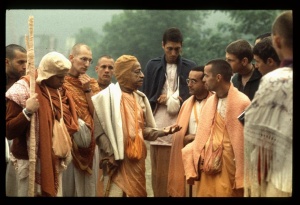SB 4.12.32

A.C. Bhaktivedanta Swami Prabhupada
TEXT 32
- sa ca svarlokam ārokṣyan
- sunītiṁ jananīṁ dhruvaḥ
- anvasmarad agaṁ hitvā
- dīnāṁ yāsye tri-viṣṭapam
SYNONYMS
saḥ — he; ca — also; svaḥ-lokam — to the celestial planet; ārokṣyan — about to ascend; sunītim — Sunīti; jananīm — mother; dhruvaḥ — Dhruva Mahārāja; anvasmarat — immediately remembered; agam — difficult to attain; hitvā — leaving behind; dīnām — poor; yāsye — I shall go; tri-viṣṭapam — to the Vaikuṇṭha planet.
TRANSLATION
Dhruva was seated in the transcendental airplane, which was just about to start, when he remembered his poor mother, Sunīti. He thought to himself, "How shall I go alone to the Vaikuṇṭha planet and leave behind my poor mother?"
PURPORT
Dhruva had a feeling of obligation to his mother, Sunīti. It was Sunīti who had given him the clue which had now enabled him to be personally carried to the Vaikuṇṭha planet by the associates of Lord Viṣṇu. He now remembered her and wanted to take her with him. Actually, Dhruva Mahārāja's mother, Sunīti, was his patha-pradarśaka-guru. Patha-pradarśaka-guru means "the guru, or the spiritual master, who shows the way." Such a guru is sometimes called śikṣā-guru. Although Nārada Muni was his dīkṣā-guru (initiating spiritual master), Sunīti, his mother, was the first who gave him instruction on how to achieve the favor of the Supreme Personality of Godhead. It is the duty of the śikṣā-guru or dīkṣā-guru to instruct the disciple in the right way, and it depends on the disciple to execute the process. According to śāstric injunctions, there is no difference between śikṣā-guru and dīkṣā-guru, and generally the śikṣā-guru later on becomes the dīkṣā-guru. Sunīti, however, being a woman, and specifically his mother, could not become Dhruva Mahārāja's dīkṣā-guru. Still, he was not less obliged to Sunīti. There was no question of carrying Nārada Muni to Vaikuṇṭhaloka, but Dhruva Mahārāja thought of his mother.
Whatever plan the Supreme Personality of Godhead contemplates immediately fructifies. Similarly, a devotee who is completely dependent on the Supreme Lord can also fulfill his wishes by the grace of the Lord. The Lord fulfills His wishes independently, but a devotee fulfills his wishes simply by being dependent on the Supreme Personality of Godhead. Therefore as soon as Dhruva Mahārāja thought of his poor mother, he was assured by the associates of Viṣṇu that Sunīti was also going to Vaikuṇṭhaloka, in another plane. Dhruva Mahārāja had thought that he was going alone to Vaikuṇṭhaloka, leaving behind his mother, which was not very auspicious because people would criticize him for going alone to Vaikuṇṭhaloka and not carrying with him Sunīti, who had given him so much. But Dhruva also considered that he was not personally the Supreme. Therefore, if Kṛṣṇa fulfilled his desires, only then would it be possible. Kṛṣṇa could immediately understand his mind, and He told Dhruva that his mother was also going with him. This incident proves that a pure devotee like Dhruva Mahārāja can fulfill all his desires; by the grace of the Lord, he becomes exactly like the Lord, and thus whenever he thinks of anything, his wish is immediately fulfilled.